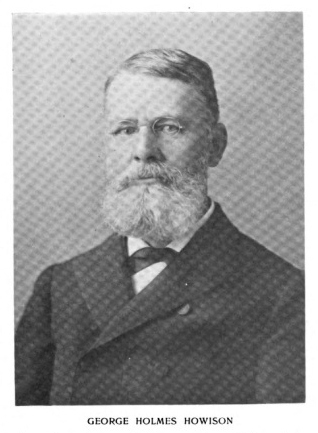Quelle: The Limits of Evolution, and Other Essays, Illustrating the Metaphysical Theory of Personal Ideaalism (1905), The Harmony of Determinism and Freedom, p.368
George Holmes Howison: Zitate auf Englisch
Quelle: The City of God and the True God as its Head (In Royce’s “The Conception of God: a Philosophical Discussion Concerning the Nature of the Divine Idea as a Demonstrable Reality”), p.89
Quelle: The Limits of Evolution, and Other Essays, Illustrating the Metaphysical Theory of Personal Ideaalism (1905), Modern Science and Pantheism, p.95
The Limits of Evolution, and Other Essays, Illustrating the Metaphysical Theory of Personal Ideaalism (1905), Appendix B: The System in its Ethical Necessity and its Practical Bearings
Quelle: The Limits of Evolution, and Other Essays, Illustrating the Metaphysical Theory of Personal Ideaalism (1905), Preface to Second Edition, p.xxxvii
Quelle: The Limits of Evolution, and Other Essays, Illustrating the Metaphysical Theory of Personal Ideaalism (1905), Appendix B: The System in its Ethical Necessity and its Practical Bearings, p.393
Quelle: The Limits of Evolution, and Other Essays, Illustrating the Metaphysical Theory of Personal Ideaalism (1905), Later German Philosophy, p.170
Quelle: The Limits of Evolution, and Other Essays, Illustrating the Metaphysical Theory of Personal Ideaalism (1905), The Limits of Evolution, p.53-4
Quelle: The Limits of Evolution, and Other Essays, Illustrating the Metaphysical Theory of Personal Ideaalism (1905), The Harmony of Determinism and Freedom, p.327
Quelle: The Limits of Evolution, and Other Essays, Illustrating the Metaphysical Theory of Personal Ideaalism (1905), The Harmony of Determinism and Freedom, p.326-7
Quelle: The Limits of Evolution, and Other Essays, Illustrating the Metaphysical Theory of Personal Ideaalism (1905), Human Immortality: its Positive Argument, p.312
Quelle: The City of God and the True God as its Head (In Royce’s “The Conception of God: a Philosophical Discussion Concerning the Nature of the Divine Idea as a Demonstrable Reality”), p.96
Quelle: The Limits of Evolution, and Other Essays, Illustrating the Metaphysical Theory of Personal Ideaalism (1905), The Right Relation of Reason to Religion, p.258
Quelle: The Limits of Evolution, and Other Essays, Illustrating the Metaphysical Theory of Personal Ideaalism (1905), The Limits of Evolution, p.39
Quelle: The Limits of Evolution, and Other Essays, Illustrating the Metaphysical Theory of Personal Ideaalism (1905), Preface to First Edition, p.xiv
Quelle: The Limits of Evolution, and Other Essays, Illustrating the Metaphysical Theory of Personal Ideaalism (1905), Later German Philosophy, p.178
Quelle: The Limits of Evolution, and Other Essays, Illustrating the Metaphysical Theory of Personal Ideaalism (1905), Later German Philosophy, p.175
Quelle: The Limits of Evolution, and Other Essays, Illustrating the Metaphysical Theory of Personal Ideaalism (1905), Modern Science and Pantheism, p.58
Quelle: The Limits of Evolution, and Other Essays, Illustrating the Metaphysical Theory of Personal Ideaalism (1905), The Right Relation of Reason to Religion, p.257
Quelle: The Limits of Evolution, and Other Essays, Illustrating the Metaphysical Theory of Personal Ideaalism (1905), The Harmony of Determinism and Freedom, p.320
Quelle: The Limits of Evolution, and Other Essays, Illustrating the Metaphysical Theory of Personal Ideaalism (1905), Modern Science and Pantheism, p.74
Quelle: The Limits of Evolution, and Other Essays, Illustrating the Metaphysical Theory of Personal Ideaalism (1905), Preface to Second Edition, p.xlvi
Quelle: The Limits of Evolution, and Other Essays, Illustrating the Metaphysical Theory of Personal Ideaalism (1905), Appendix D: Reply to a Review in the New York Tribune, p.412-3
guilt, not simply before some external tribunal, be it even God's, but guilt before the more inexorable bar of our own soul.”
Quelle: The Limits of Evolution, and Other Essays, Illustrating the Metaphysical Theory of Personal Ideaalism (1905), The Harmony of Determinism and Freedom, p.370-1
Quelle: The Limits of Evolution, and Other Essays, Illustrating the Metaphysical Theory of Personal Ideaalism (1905), The Right Relation of Reason to Religion, p.250
Quelle: The Limits of Evolution, and Other Essays, Illustrating the Metaphysical Theory of Personal Ideaalism (1905), The Limits of Evolution, p.40-1
Quelle: The Limits of Evolution, and Other Essays, Illustrating the Metaphysical Theory of Personal Ideaalism (1905), The Limits of Evolution, p.54
Quelle: The Limits of Evolution, and Other Essays, Illustrating the Metaphysical Theory of Personal Ideaalism (1905), The Harmony of Determinism and Freedom, p.342-3
Quelle: The Limits of Evolution, and Other Essays, Illustrating the Metaphysical Theory of Personal Ideaalism (1905), Later German Philosophy, p.171
Quelle: The Limits of Evolution, and Other Essays, Illustrating the Metaphysical Theory of Personal Ideaalism (1905), The Right Relation of Reason to Religion, p.240-1
